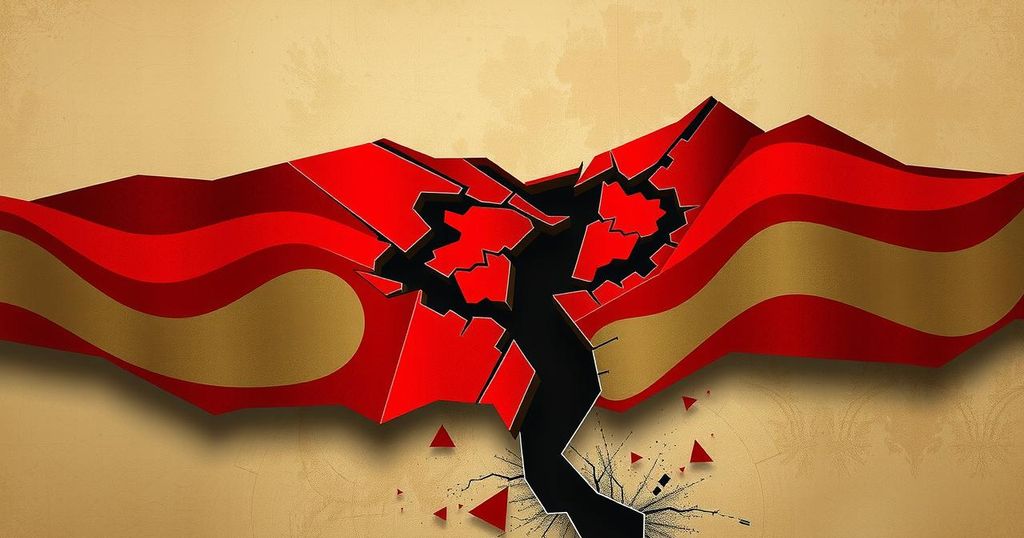Syrian Government’s Inaction on Minorities Fuels Israeli Destabilization Efforts

The Syrian government’s failure to protect its Druze minority amidst escalating violence leaves room for Israeli exploitation, complicating the already fragile socio-political landscape. Israel has intensified its military involvement, presenting itself as a protector, which analysts warn might reshape Syria’s future along sectarian lines.
The ongoing conflict in Syria is taking a troubling turn as the Syrian government’s failure to protect minority rights has opened avenues for destabilization, particularly through Israel’s intervention. Recent sectarian violence, which left over 100 individuals dead in Druze-majority regions, has compelled Israel to present itself as a protector of the Druze people, according to observers. Analysts suggest that the turmoil can be traced back to inflammatory social media propaganda that accused a Druze cleric of blasphemy, despite the claim being debunked by both Syrian authorities and Druze religious leaders.
The tragic events unfolded after a voice recording surfaced online, igniting sectarian hostilities. Leaders from the Druze community, a branch of Islam, argued that the insult attributed to their faith is completely contrary to their beliefs. Nonetheless, the situation rapidly escalated, with Islamist militants, some linked to the current Syrian regime, targeting Druze-dominant areas such as Jaramana and Sahnaya. As tensions simmered, the Druze community mobilized in self-defense, with armed groups rallying to protect their towns against the rising aggression.
Israel’s military response—including airstrikes near the Syrian presidential palace—marks a notable increase in its involvement. Prime Minister Benjamin Netanyahu framed these actions as measures to safeguard the Druze population and inhibit Syrian military movements south of Damascus. Analysts contend that Israel is capitalizing on Syria’s weakened state, created by internecine strife and rampant violence, to reshape its political landscape to Israel’s advantage.
Riad Kahwaji, a military expert, emphasized that Israel seeks to diminish the Syrian central authority, favoring a fragmented territory divided along sectarian lines. Such a scenario could produce various statelets—including a Druze state—reinforcing Israel’s own legitimacy and security. Kahwaji elaborates that this strategic repositioning aims to pre-empt any resurgence of a strong Syrian government, particularly one aligned with Turkish interests which perpetuate hostilities towards Israel.
The conflict also ties into Israel’s longstanding objective of fully annexing the Golan Heights, a region of both strategic and symbolic significance. They currently control two-thirds of this territory—a move unrecognized by the international community. Analysts suggest that Israel’s actions are intended to solidify its hold over Golan Heights while negotiating acceptance of its sovereignty over the entirety of the region, amidst increasing tensions.
In response to Israel’s recent military actions, Syrian officials condemned the strikes, arguing they pose a direct threat to regional stability and constitute violations of international law. Moreover, the Assad-led government has strained credibility regarding its capacity to control outbreaks of sectarian violence, essentially accusing outlaw groups of instigating such tensions. Nevertheless, critics point out that the government has been ineffective in curtailing the violent escalation that has ensued since the fall of Bashar Al Assad’s regime in December 2024.
Analysts and local observers argue that the government’s inaction is a deliberate tactic aimed at consolidating control over fragmented territories. Joseph Daher, a prominent Syrian academic, stated that this is indicative of a broader effort to reestablish authority where government influence is waning. He also warns that Israel’s involvement complicates matters for the Druze community, who largely oppose being used as pawns in the ongoing geopolitical chess match.
Ultimately, the fragility of the situation is underscored by the failures of the Syrian authority to maintain order and protect its minorities. The event history—marked by recent violence against the Druze community—justifies fears that instability will further encourage the exploitation of sectarian divisions by external players, particularly Israel.
As the regional dynamics evolve, the future of Syria remains uncertain, especially for its minority populations, facing an uphill struggle for safety and recognition in a country where political chaos reigns.
In summary, the Syrian government’s inability to protect minority rights in the wake of rising sectarian violence has inadvertently opened doors for Israeli intervention. Israel’s emerging role as a protector of the Druze community highlights the complex geopolitical landscape resulting from this turmoil. The situation raises profound concerns about the stability of Syria and the future of its minority populations, caught in the crossfire of global power struggles.
Original Source: www.thenationalnews.com








